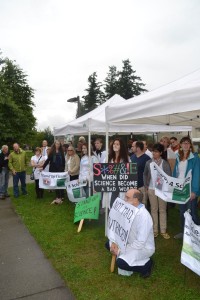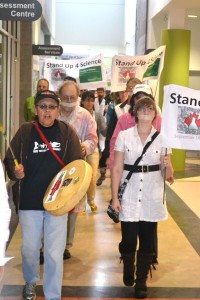By Ashley Mussbacher (Contributor) – Email
Print Edition: September 18, 2013


“I’m not mad, I’m outraged,” was one of the many signs sported by students, faculty, and local activists as they gathered on the green at the Abbotsford campus to protest the federal government’s lack of funding for scientific advances.
The Stand Up for Science rally met in 14 cities across the country, from Yellowstone to Halifax. UFV protestors arrived on the green wearing lab coats and with tape over their mouths.
“The national campaign far surpassed our expectations,” said John Vissers, a local activist from the Fraser Valley. “We are thrilled we can do this in Abbotsford and send a message to Ottawa.”
The message: scientists refuse to be silenced. Eddie Gardner, UFV’s elder-in-residence, attended the rally on September 16 with a traditional Sto:lo drum in hand. He led the protesters through the halls of UFV in a march, drawing attention and curiosity from onlookers.
Dean of Science Lucy Lee said that funding is being cut from primarily undergraduate institutions (PUIs).
“At UFV here, we have superb instructors and researchers whose small but significant funding, that supported undergraduate research experiences, have been cut,” she said. “We have less funding than ever and our aging equipment and lack of space is causing the big wait lists in many of our course offerings. Lack of funding has been chronic, and we need the country know that this is unsustainable.”
The Conservative government started stifling science in 2006 when they ended funding for the One Tonne Challenge, a challenge presented to Canadians to reduce their greenhouse gas emissions by one tonne per year.
The last two years alone are riddled with funding cuts and facility closures. Space exploration, basic science, and environmental studies are just a few of the departments that have been on the chopping block. Key acts include Canada’s withdrawal from the Kyoto Accord in 2011, the eliminateion of the Experimental Lakes Area program in 2012, and the XL pipeline approval in 2013.
The decline of scientific support from the government effects all branches of science. Recently, the agricultural industry has experienced cuts, and the Department of Fisheries and Oceans libraries was shut down. Gardner, who was part of a program to save wild salmon from open net feedlots, explained that science is able to find truth and allow people to make better choices toward preservation in the future.
“It’s really important to acknowledge that science, if it’s done the right way, if it’s open and transparent, the right action can save something like the keystone species,” he said. “Science can reveal and bring out the kind of truth that will allow us as human beings to follow up and do the right thing … to preserve what needs to be preserved, protect what needs to be protected.”

